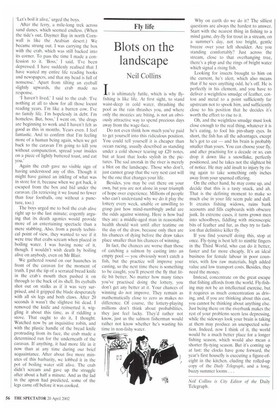Fly life
Blots on the landscape
Neil Collins
It is ultimately futile, which is why flyfishing is like life. At first sight, to stand waist-deep in cold water, thrashing the pool as the rain thrashes you, and where only the mozzies are biting, is not an obviously attractive way to spend precious days away from the wage-face.
Do not even think how much you've paid to get yourself into this ridiculous position. You could tell yourself it is cheaper than ocean racing, usually described as standing under a cold shower tearing up f20 notes, but at least that looks stylish in the pictures. The sad anorak in the river is merely a blot on the landscape. Those who don't, just cannot grasp that the very next cast will be the one that changes your life.
Besides, you may be out there on your own, but you are not alone in your triumph of hope over experience. Millions of people who can't understand why we do it play the lottery every week, unable or unwilling to grasp just how mind-numbingly awful are the odds against winning. Here is how bad they are: a middle-aged man in reasonable health should wait until after teatime on the day of the draw, because only then are his chances of dying before the draw takes place smaller than his chances of winning.
In fact, the chances are worse than those of catching a salmon by casting into an empty pool — you obviously won't catch a fish, but the practice will improve your casting, so the next time there is something to be caught, you'll present the fly that little bit better. No matter how many times you've practised doing the lottery, you don't get any better at it. Your chances of winning do not improve. They remain as mathematically close to zero as makes no difference. Of course, the lottery-playing millions don't think about probabilities, they just feel lucky. They'd rather not know, just as the salmon fisherman would rather not know whether he's wasting his time in non-fishy water.
-------- Why on earth do we do it? The silliest questions are always the hardest to answer. Start with the nearest thing in fishing to a mind game, dry-fly for trout in a stream, on a summer's day, not too bright, gentle breeze over your left shoulder. Are you standing comfortably? Just across the stream, close to that overhanging tree, there's a plop and the rings of bright water which signal a rising fish.
Looking for insects brought to him on the current, he's alert, which also means that if he sees anything odd, he's off. He is perfectly in his element, and you have to deliver a weightless smudge of feather, cotton and metal to a point sufficiently far upstream not to spook him, and sufficiently close to his position that he decides it's worth the effort to rise to it.
Oh, and the weightless smudge must look close enough to the real thing, whatever it is he's eating, to fool his pin-sharp eyes. In short, the fish has all the advantages, except he's got to eat — and his brain is probably smaller than yours. You can choose your fly, and after practising for a decade or so, can drop it down like a snowflake, perfectly positioned, and he takes not the slightest bit of notice. He may add insult to injury by rising again to take something only inches away from your spurned offering.
On the other hand, he may come up, and decide that this is a tasty snack, and ah. That is the defining moment to make so much else in your life seem pale and dull. It creates fishing widows, ruins bank accounts and fills cupboards with obscure junk. In extreme cases, it turns grown men into schoolboys, fiddling with microscopic bits of feather and fur, as they try to fashion that definitive killer fly.
If you find yourself doing this, stop at once. Fly-tying is best left to nimble fingers in the Third World, who can do it better, faster and far more cheaply. It's an ideal business for female labour in poor countries, with few raw materials, high added value and low transport costs. Besides, they need the money.
Instead, concentrate on the great escape that fishing affords from the world. Fly-fishing may not be an intellectual exercise, but it requires as much concentration as driving, and, if you are thinking about this cast, you cannot be thinking about anything else. Just being there on the riverbank makes the rest of your problems seem less depressing, while the sideways look your brain is taking at them may produce an unexpected solution. Indeed, now I think of it, the world would be a much better place for a longer fishing season, which would also mean a shorter fly-tying season. But it's coming up at last: the clocks have gone forward, the year's first housefly is executing a figure-ofeight in the kitchen, eluding the rolled-up copy of the Daily Telegraph, and a long, buzzy summer looms . . .
Neil Collins is City Editor of the Daily Telegraph.






































































 Previous page
Previous page